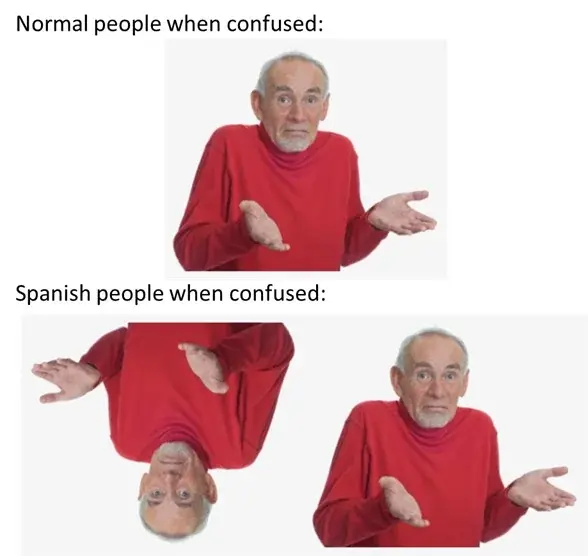this post was submitted on 05 Nov 2023
1523 points (98.4% liked)
Memes
46162 readers
1538 users here now
Rules:
- Be civil and nice.
- Try not to excessively repost, as a rule of thumb, wait at least 2 months to do it if you have to.
founded 5 years ago
MODERATORS
you are viewing a single comment's thread
view the rest of the comments
view the rest of the comments

Yeah, I never got the upside-down questionmark as well 😂.
In Spanish questions are phrased the same way as affirmations, when you are speaking the only difference is the intonation. Without a mark to say you are starting to read a question it's possible that the meaning changes in the end which would be annoying. (Source: Portuguese is the same but has no inverted question mark, and sometimes it's mighty annoying, especially with long questions)
Funny enough English does this all the time:
All have different intonations and punctuation but are otherwise the same. Internet lingo does compensate for this somewhat but at least in "proper" form the above holds true for all kinds of situations
1 Food that is edible
2 Tasty food
3 Bad looking food
4 Either happy or disgusted at what was just in your mouth
5 Defending your cooking after it’s referred to as 1-4
Imagine if you could ask questions like "James, Mary, and Jack went to the market last Saturday to buy a shovel, a black bag, and some gloves, to bury Karen's corpse in the deep dark woods?"
No no no, James, Mary, and Jack went to the market last Saturday to buy a shovel, a black bag, and some flashlights, to bury Karen's corpse in the deep dark woods
English can do that too, but it’s not really a “proper” way of doing it. The proper way would be to say “is that food?”
There are languages where the only way to pose a question is to change the intonation.
But doesn't the intonation simply go up in the end? So it's good enough to stumble over the ? in the end.
I honestly haven’t paid attention where it starts going up. But I always thought that doing the two “?”s in Spanish was pretty clever for that reason.
¿What if you just used them anyway?
¡Problem solved!
Yeah that's true for any language really
Not really. In my language subject and verb get switched around in a question. So you immediately know it’s a question when you start reading the sentence.
Can you give me an example?
Edit: Ok thanks guys, I got it :D
Maybe
but taken to the extreme?
Hij schreef een bericht. (He wrote a message)
Schreef hij een bericht? (Did he wrote a message?)
Zeg eens, waarom wil je zo graag met een CEO slapen?
Fuck Spez daarom
I know you already got it but a few others came to my mind:
Finnish, which not a tonal language:
Japanese:
I think you'll find the pattern of question words/suffixes in nearly every language that is not explicitly tonal.
Yeah that's initially why I thought there was no difference to Spanish. But the difference is Spanish actually doesn't have an option where you switch subject and verb. Didn't know that :)
Oh. Very good point. I did not know that either.
É de facto irritante. Nada como estar na escola e um prof pede para ler. Estás calmamente a ler o texto e de repente tens de forçar a porcaria da entoação para sobrecompensar o facto de que não reparaste que era uma pergunta
It's so you can start reading a sentence in the correct intonation
This can’t be right. It’s far too simple and logical. I’m a native English speaker, and I’m used to grammar that’s nonsensical and inconsistent.
In spanish questions intonation changes occur only on the last word(s), not the whole sentence. I'm not a linguistic, but I think it's so you can be sure a sentence is a question from the start.
When reading english sometimes I assume a sentence is an affirmation until I see the question mark, and then I have to reinterpret the sentence. I wonder how it is for native english speakers. Do they assume nothing until the sentence is finished?
You are indeed right, my explanation was poor. But for other languages it is very common to get surprised at the end of sentences, yes.
In English most questions stay flat and only raises the pitch on the last syllable, if any. In Spanish we can raise the pitch on the first word and stay flat for the rest of the question. That's what's useful about the ¿
Solo me fijé en la ultima palabra, no en la primera. Tal vez nunca me di cuenta que si cambia
*either
Grammar nazi out.
Yes, that would be better 👍.